“Tears are subversive”
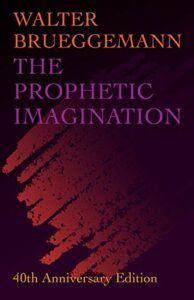 “Tears are subversive,” Walter Brueggemann taught in his mighty Prophetic Imagination. That is, the pathos experienced by the likes of Jeremiah and Jesus, who openly wept, is indicative of their ultimate hope that the status quo can be transformed. It seems Brueggemann is saying that those who have no pathos — literally, who are apathetic, or, in modern lingo, have no skin in the game — are essentially satisfied with how things are, so they obviously are not going to be prophetically imaginative. Nobody will work to
“Tears are subversive,” Walter Brueggemann taught in his mighty Prophetic Imagination. That is, the pathos experienced by the likes of Jeremiah and Jesus, who openly wept, is indicative of their ultimate hope that the status quo can be transformed. It seems Brueggemann is saying that those who have no pathos — literally, who are apathetic, or, in modern lingo, have no skin in the game — are essentially satisfied with how things are, so they obviously are not going to be prophetically imaginative. Nobody will work to 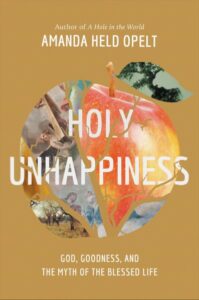 change things if they don’t actually first mind the current arrangements. We need what Fred Buechner called “the ants in the pants of faith.” In the words of Amanda Held Opelt, in a slightly different context, we need “holy unhappiness.” It’s okay, and maybe a mark of maturity.
change things if they don’t actually first mind the current arrangements. We need what Fred Buechner called “the ants in the pants of faith.” In the words of Amanda Held Opelt, in a slightly different context, we need “holy unhappiness.” It’s okay, and maybe a mark of maturity.
There is a lot of sadness about to hit us during Holy Week. Apart from the tragedies of this world — you know the horrid list of wars and rumors of wars — there is, in our liturgical calendar, a time to seriously commemorate the betrayal and arrest, abuse and torture, execution and Holy Saturday darkness, of our Lord and Savior and Friend, Jesus of Nazareth, the Christ. It is not for the faint of heart, this classic, historic, Christian practice. There will be tears.
Our little adult education class this Lent has had a remarkable course on the Biblical texts of the Stations of the Cross. (Years ago, Pope John Paul, noting that some of the beloved Catholic “stations” were based on extra-biblical sources, put together what is called the Scriptural Stations of the Cross, with each station based on a Biblical episode, and we Presbyterians used that format.) A different teacher reflected each week on two or three of these painful Biblical narratives and — get this! — we invited folks from the church to offer an art piece for each station. Serious artists, professional graphic designers, and some with amateur skills in drawing, watercolors, oils, and more, came forward and shared how deeply meaningful (even if often emotionally hard) it was for them to intentionally engage these bloody stories. We’ve taken all fourteen pieces and arranged them in a room with a booklet of the texts and the artist’s statements for folks to ponder before and after services during Holy Week.
It has been a moving time for a few of us, at least, to attend to the suffering of our Lord and to reflect on all that implies — not only as he gives himself over to a hard fate willingly for us, but the notion that Christ suffers not only for us but with us. For some this idea has been revolutionary. Maybe even subversive.
Of course, this naturally leads to what should be obvious: if Christ Himself suffers with those who are hurting most, and we are in Him, one with Him, following closely in His ways, we, too, then, simply must find ourselves, in one way or another, with the hurting. Whether it is volunteering at a hospice care facility or offering reprieve to the parents of a sick child, whether it is standing with fearful immigrants (who candidate Trump recently called “animals”) or holding the hand of someone who lost a loved one, there are many ways to love God by serving others.
As an aside, for starters, I might invite you to consider books on this general theme; here are just some that quickly come to mind.
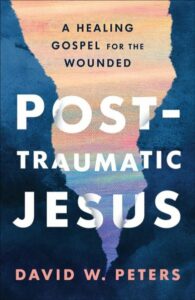 That an Iraqi war vet who was an enlisted Marine and an Army Chaplain, has recently done a set of reflections on the life of Jesus considered from a “trauma-informed” framework just might shake a few of us up: see his new Post-Traumatic Jesus: A Healing Gospel for the Wounded by David W. Peters (WJK; $19.00 // OUR SALE PRICE = $15.20.)
That an Iraqi war vet who was an enlisted Marine and an Army Chaplain, has recently done a set of reflections on the life of Jesus considered from a “trauma-informed” framework just might shake a few of us up: see his new Post-Traumatic Jesus: A Healing Gospel for the Wounded by David W. Peters (WJK; $19.00 // OUR SALE PRICE = $15.20.)
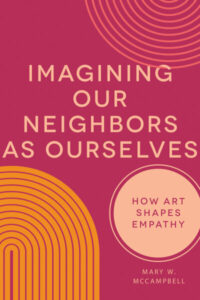 Please recall that our friend Mary McCampbell wrote a very good book on empathy and how that virtue can be kindled by reading fiction and taking in good songs and movies. It is called Imagining Our Neighbors as Ourselves: How Art Shapes Empathy (Fortress; $28.00 // OUR SALE PRICE = $22.40.)
Please recall that our friend Mary McCampbell wrote a very good book on empathy and how that virtue can be kindled by reading fiction and taking in good songs and movies. It is called Imagining Our Neighbors as Ourselves: How Art Shapes Empathy (Fortress; $28.00 // OUR SALE PRICE = $22.40.)
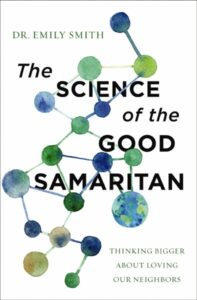 I also reviewed not that long ago a very fine book by Emily Smith called The Science of the Good Samaritan: Thinking Bigger about Loving Our Neighbor Zondervan; $19.99 // OUR SALE PRICE = $15.99.) It is really fascinating, with a bit of brain-science, some good Bible study, and a refreshing call to care.
I also reviewed not that long ago a very fine book by Emily Smith called The Science of the Good Samaritan: Thinking Bigger about Loving Our Neighbor Zondervan; $19.99 // OUR SALE PRICE = $15.99.) It is really fascinating, with a bit of brain-science, some good Bible study, and a refreshing call to care.
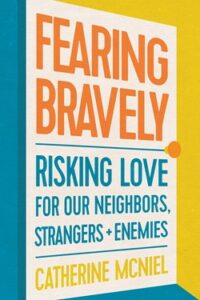 I adored the eloquent and fiesty invitation to a life of risky compassion by Catherine McNiel called Fearing Bravely: Risking Love for Our Neighbors, Strangers, and Enemies (NavPress; $16.99 // OUR SALE PRICE = $13.59.) We promoted her other great books and this one deserves a big thanks. Yes!
I adored the eloquent and fiesty invitation to a life of risky compassion by Catherine McNiel called Fearing Bravely: Risking Love for Our Neighbors, Strangers, and Enemies (NavPress; $16.99 // OUR SALE PRICE = $13.59.) We promoted her other great books and this one deserves a big thanks. Yes!
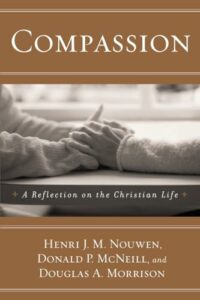 And who can forget the 1980s classic by Henri Nouwen, Compassion: A Reflection on the Christian Life which was co-written with Donald McNeill and Douglas Morrison (Image; $16.00 // OUR SALE PRICE = $12.80.) Nouwen taught a course on this a Yale, maybe only once, and this book emerged, bracingly, beautifully. A classic.
And who can forget the 1980s classic by Henri Nouwen, Compassion: A Reflection on the Christian Life which was co-written with Donald McNeill and Douglas Morrison (Image; $16.00 // OUR SALE PRICE = $12.80.) Nouwen taught a course on this a Yale, maybe only once, and this book emerged, bracingly, beautifully. A classic.
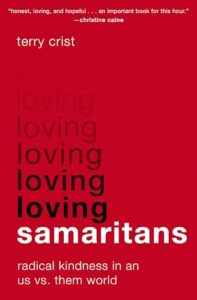 Pastor and missionary Terry Crist has a great new one which is very practical called Loving Samaritans: Radical Kindness in an Us vs Them World (Zondervan; $19.99.) It’s a message we need, eh? He’s good and I’m sure will help many learn kindness and grace; not a bad place to start, eh?
Pastor and missionary Terry Crist has a great new one which is very practical called Loving Samaritans: Radical Kindness in an Us vs Them World (Zondervan; $19.99.) It’s a message we need, eh? He’s good and I’m sure will help many learn kindness and grace; not a bad place to start, eh?
There is no shortage of powerful books to keep us motivated and wise in our nurturing of the kind of love that, inspired by Jesus Himself, suffers with others. Might you want to order one of these?
In our Wednesday night Zoom Bible study we have been studying the book of Galatians, Paul’s manifesto of freedom in relationship to his view of the law, Of the many, many thrilling verses, one stood out this past week: “Bear one another’s burdens and so fulfill the law of Christ.” (Galatians 6:2.)
“Bear one another’s burdens and so fulfill the law of Christ.” (Galatians 6:2.)
Here are some excellent books briefly noted that might help us do just that. None are suggested as easy answers or that we who are sane and good have to “help” those who are needy. Don’t misunderstand; we commend caring presence and empathetic solidarity, not becoming a self-righteous do-gooder. Still, these are resources that might inform our minds to understand more and our expand hearts to care more properly and wisely. I hope these help us be companions for those with extra burdens.
HELPING BEAR THE GRIEF and HARDSHIPS OF OTHERS
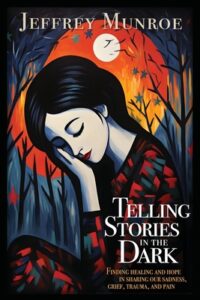 Telling Stories in the Dark: Finding healing and Hope in Sharing Our Sadness, Grief, Trauma, and Pain Jeffrey Monroe (Reformed Journal Books) $21.99 OUR SALE PRICE = $17.59
Telling Stories in the Dark: Finding healing and Hope in Sharing Our Sadness, Grief, Trauma, and Pain Jeffrey Monroe (Reformed Journal Books) $21.99 OUR SALE PRICE = $17.59
I have written about this (and spoken about it in our new Hearts & Minds podcast) so I won’t say much. Monroe is the acclaimed author of the definitive book Reading Buechner and here he uses his writerly chops and pastoral skills to tell, in each chapter, the often horrific story of a person’s or family’s loss or suffering or grief. Then, he invites another author, counselor, theologian, writer, or pastor to interact with his telling of the tale and see what they think. Inevitably, the story alone is well worth the price of the book — some are about accidental death, racial trauma, suicide, mental health issues, and more — but the extra insight gleaned in conversation with another expert makes it brim with take-aways and practical insight for caring. The biggest take- aways: you are not alone and there is power in telling stories. What a book!
(We have some handsome hardcovers that we are selling at the paperback prices, by the way. Hooray.)
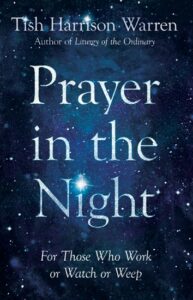 Prayer in the Night: For Those Who Work or Watch or Weep Tish Harrison Warren (IVP) $22.00 OUR SALE PRICE = $17.60
Prayer in the Night: For Those Who Work or Watch or Weep Tish Harrison Warren (IVP) $22.00 OUR SALE PRICE = $17.60
Oh my, is it tiresome that I sometimes tell you about the same book over and over? I know we’ve highlighted this before in different lists and contexts but here, for now, it simply is one we must list. It is, truly, a must-read.
We’ve adored Tish since reading her extraordinary, excellent Liturgy of the Ordinary, one of my favorite books not only for it’s fine writing and solid perspective, but just for the darn clever format of the whole thing — she finds God’s presence throughout the day as she recalls stuff she learned in liturgy. From morning to night in a variety of ordinary experiences she remembers how worship informed her way of life.
This one is equally well written, with lots of personal stories and good citations from great books and keen spiritual insight. However the stories here are at times a bit dark — the book opens with her in the emergency room, bleeding, in the midst of a tragic miscarriage. All she can think of to do — what she just has to do, is read / pray from her Anglican Book of Common Prayer.
The evening compline prayer from the BCP is what gives this book structure as she unpacks various phrases from the beautiful, haunting, comforting prayer. It is, as she shares in this most vulnerable book, a book about praying at night, literally, but more, about the metaphor of darkness, praying in times of sadness, loss, greif, confusion. She has seen her share, and she honestly reminds us that this is, actually, fairly normal in a fallen world, and God understands our pain and sorrow.
Prayer in the Night is one of my favorite books and I recommend it often. I suggest it now as a window into a thoughtful young woman who learns to suffer well, and a priest who takes her evening prayers seriously. It is a gem for anyone who likes to read, and a lifeline for those who work or watch or weep.
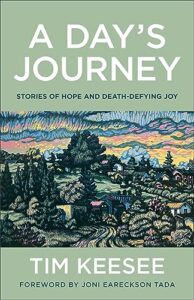 A Day’s Journey: Stories of Hope and Death-Defying Joy Tim Keesee (Bethany House) $16.99 OUR SALE PRICE = $13.59
A Day’s Journey: Stories of Hope and Death-Defying Joy Tim Keesee (Bethany House) $16.99 OUR SALE PRICE = $13.59
The author, Tim Keesee, is a creative, global leader, a filmmaker and founder of Frontline Missions International, a ministry that advances the gospel in the world’s most difficult places. After years of crisscrossing the world, he got cancer, not once but twice, and these terminal diagnoses put his adventuresome travels to a halt.
Here, he picks up his pen to write “dispatches from a smaller, more intimate world.” He writes about ordinary folks who have suffered in, sadly, ordinary ways. A few of these are dramatic, people in dangerous lands beat for their faith. But many are just ordinary people facing sets-backs, chronic pain, hard questions. This is a fabulously written book, poignant and inspiring, modeling joy we can discover, even as we bear crosses. There is a very compelling foreword by Tim’s friend, Joni Eareckson Tada.
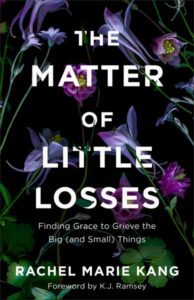 The Matter of Little Losses: Finding Grace to Grieve the Big (and Small) Things Rachel Marie Kang (Revell) $17.99 OUR SALE PRICE = $14.39
The Matter of Little Losses: Finding Grace to Grieve the Big (and Small) Things Rachel Marie Kang (Revell) $17.99 OUR SALE PRICE = $14.39
I reviewed this already and now want to suggest it here, as a way to learn not only how to grieve what needs to be grieved yourself — do you recall a book from decades ago called Praying Our GoodByes? — but also as a tool to help you nurture a sense of being sensitive to others needs and pitfalls. It’s wise and well written; Kang also wrote Let There Be Art and is founder of The Fallow House. We are fans.
Here’s a very fun fact about this book: each chapter is inspired, or plays with the image and metaphor, or a flower. Small wounds can be like “paper cuts to the heart”, she says, but she arranged this compassionate book around stories, art, and nature scenes, with each chapter a different flowering plant. From “Rosemary for Rememberance” to “Camellia for Home” to “Azaleas for Suicide” to “Baby’s Breath for Matrescence”, this is a remarkable book. The first, major part includes “reflections on grief” while the last portion is under the rubric of “reflections for grief.” Really nicely done.
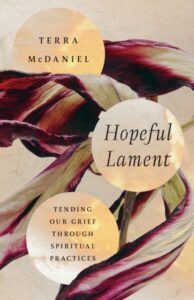 Hopeful Lament: Tending our Grief Through Spiritual Practice Terra McDaniel (IVP) $18.00 OUR SALE PRICE = $14.40
Hopeful Lament: Tending our Grief Through Spiritual Practice Terra McDaniel (IVP) $18.00 OUR SALE PRICE = $14.40
There has been a renaissance of books about lament in recent years and we are grateful. From A Sacred Sorrow: Reaching Out to God in the Lost Language of Lament by the great Michael Card (NavPress) to Prophetic Lament: A Call for Justice in Troubled Times by Soong-Chan Rah (IVP) to Dark Clouds, Deep Mercy: Discovering the Grace of Lament (Crossway) by Mark Vroegop to You Can Talk to God Like That: The Surprising Power of Lament to Save Your Faith by Abby Norman (Broadleaf), there is something for every style or tone.
This new one, Hopeful Lament, is specifically about tending to our grief and it invites us to discover lament as a spiritual practice. In this sense, it “makes space for the powerful act of crying out before a loving God” which is followed by provoking questions to reflect upon, lists of embodied practices, and applications (even some for families with children.) Grace Ji-Sun Kim says it “goes about the hard but transformative work of recognizing real pain and pursuing wholeness.”
Lament and sadness go together, but they are not the same thing. Terra McDaniel poignantly shows how Christian lament is about disciplined sadness, holy prayer, formative practices, and believing in the possibility of hope without rushing to joy prematurely, all because of Christ. We will all grieve, there is a way to learn to grieve well, and this is a faithful guide and companion. — Nijay K. Gupta, professor of New Testament at Northern Seminary, author of Tell Her Story
HELPING BEAR THE BURDEN OF ADDICTIONS
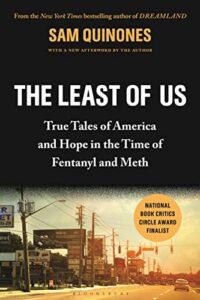 The Least of Us: True Tales of America and Hope in the Time of Fentanyl and Meth Sam Quinones (Bloomsbury) $18.00 OUR SALE PRICE = $14.40
The Least of Us: True Tales of America and Hope in the Time of Fentanyl and Meth Sam Quinones (Bloomsbury) $18.00 OUR SALE PRICE = $14.40
I would hope you know Dreamland: The True tale of America’s Opiate Epidemic that came out to such acclaim in 2015. This follow up, years in the making, is stunning in its breath and moral passion, its good care about showing the horrors of our shift from OxyContin (thanks to merciless self-promotion to the tune of billions in profits by the Sackler-owned Purdue Pharma ) to heroin to various sorts and waves of meth to super deadly fentanyl. Quinones moves around in the conversation from legit (and less legit) science labs to Mexican drug cartels and meth factories, from those suffering from inevitable relapse (getting off these modern-day versions of the drugs is so much harder than with other addictions) to the history of the science of brain studies.What a wild, strange trip it is, and it is truly one of the very best nonfiction books I have read this year.
The Least of Us is one of the most moving, tragic, fascinating, compelling books of creative nonfiction I have read this year, up there with my top few favorites, ever, the very moving Boys in the Bunkhouse and Wasteland and Just Mercy and Factory Man and The Snakehead and At Home on an Unruly Planet. It’s a must-read, I think.
I should say more but I beg you to consider this wide-ranging, well-written, captivating study of sorrow and injustice, but also of hope and change, featuring ways some creative places are finding new ways to care for the least of these; the least of us. His storytelling about scenes of hope, care, recovery, and small steps towards community renewal are inspiring.
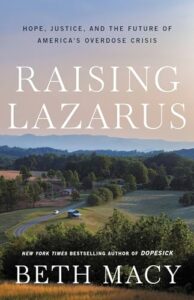 Raising Lazarus: Hope, Justice, and the Future of America’s Overdose Crisis Beth Macy (Back Bay Books) $19.99 OUR SALE PRICE = $15.99
Raising Lazarus: Hope, Justice, and the Future of America’s Overdose Crisis Beth Macy (Back Bay Books) $19.99 OUR SALE PRICE = $15.99
Not unlike Sam Quinones, Beth Macy has poured her life into understanding and reporting on the various aspects of the complicated opioid crisis. I hope you have read her riveting Dopesick upon which the award-winning Netflix series was based. (And in this breathtaking follow-up, Raising Lazarus, she has a few brief allusions to the ways in which the notably evil Sackler family hassled her — as they did with the fearless writer Patrick Radden Keefe, they followed her with an ominous van and sent exceptionally threatening letters. Not that it stopped her on iota.)
If Sam Quinones is a fair-minded reporter who cares deeply about the crisis — a half a million deaths over a few years is surely a crisis, surpassing even the horrors of the Covid pandemic! — Macy is now a dogged, on-the-ground advocate, bearing witness to the unprecedented national health-care crisis. And that is what she insists that it is with failures in Medicaid and state’s institutional intransigence (or worse) and writes with righteous anger and notable verve, reporting on her travels in an underground of those doing life-saving, evidence-based, scientifically-proven harm mitigation such as needle exchanges and bus treatments. Some heroes — many themselves recovering from pain relief med addictions or bearing the memories of loved ones lost to overdoses — have dedicated years of their lives to reforms such as the proven efficacies of drug courts (instead of standard jail time) and other harm reduction plans.
Years of shame and criminalization and mass incarceration stemming mostly from Nixon and Reagan’s old, vicious (and racist) “War on Drugs” and, to some extent, the “just say no” banalities from 12-step programs (that may work with alcohol but less so with the modern designer drugs that impact the brain so very decisively), keep many from imagining more humane, fruitful, (and cost effective) ways to extend lifesaving care to the homeless and addicted, but their brave (and often civilly disobedient) moves have inspired Macy to write this “paean to the power of community activism.”
As we learned in both Dopesick and Dreamland, Macy and Quinones are excellent reporters, caring journalists, expert writers, and humane witnesses to one of the most awful episodes in American history, the almost out of nowhere mass addictions caused, knowingly, by Sackler-driven pushing of Oxycodone in places like West Virginia and rural Ohio and other working class communities where there were a lot of physical pain. That the drug was pushed with assurances of it not being addicting, and that the massive amounts of addictions lead quickly to heroin and then, quickly, to meth and then Fentanyl is an astonishing story, with millions of people made mad, crazed, homeless, helpless.
Quinones tells how all that happened better than anyone. Macy tells in passionate prose what people are doing about it, from protesting the unbelievable way the Sacklers drained billions upon billions from their company in egregious bankruptcy schemes and off-shore accounts (sometimes learning about the arcana of bankruptcy law in order to fight such injustices, she observes, “can be an act of love”) to how activists — often folks on the fringes of society, anyway — create new sorts of safe consumption sites and therapy centers and needle exchange programs, literally saving lives. I was moved to tears by some of the heroic, tireless, caring service provided by social workers and drug-abuse counselors describe in Raising Lazarus, especially a chapter called “Backburn.” It will humble you and give you faith in what some people are doing to help their fellow humans. As the book moved to its final chapters I was nearly shaking; Raising Lazarus is a book you really should read. — but hold on. It’s takes you to places I bet you’ve never been before.
Kudos for both The Least of Us and Raising Lazarus. For those that care about such things, it is curious, too, that both authors draw from Biblical images for their book titles. A lot of good Christian folks who do the messy work of helping others — unwrapping the smelling, half dead Lazarus, as it were — appear in these books, by the way, as do some doggedly rigid, narrow-minded, mean ones. Read these riveting, important big books to learn the difference.
From Beth Macy’s closing pages:
The opioid-litigation money is a once-in-a-generation opportunity. The Sacklers willfully created the opioid crisis. They shamelessly lied to the health care community and enlisted their aid in carrying out a murderous rampage that has victimized hundreds of thousands of people in this country.
History will judge them for that. History may forgive those who thought they’re doing the right thing but were misled by those they’d been trained to trust.
But how we respond to the horrors that have resulted will determine how we are judged. Best not to give up too quickly on a neighbor; best not to judge a stone too heavy to roll.
Only when endeavoring to help in the face of so much suffering can we bear witness to the miracle of raising Lazarus.
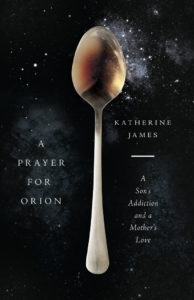 A Prayer for Orion: A Son’s Addiction and a Mother’s Love Katherine James (IVP) $16.00 OUR SALE PRICE = $12.80
A Prayer for Orion: A Son’s Addiction and a Mother’s Love Katherine James (IVP) $16.00 OUR SALE PRICE = $12.80
When this first came out I raved about it, a memoir I couldn’t put down. We had met Katherine and our hearts went out to her and her husband, who worked for the campus ministry organization Cru. Open-hearted and gracious, they affirmed their kid’s passions, encouraged their artistic styles and hip music, gladly welcomed their edgy friends into their home, but had no idea that drug abuse was becoming a thing, right under their proverbial noses.
A Prayer for Orion is the exceptionally eloquent, altogether moving story of all that went down. In 2020 it was surely one of the best books I had read that year and I think it would be wise for many to read it now — you may have friends going through this but are too stuck in shame to admit it or to share the details of how their loved ones went off the rails.
As a parent, A Prayer for Orion nurtured such empathy in me and reminded me of the urgency of learning more about the phenomenon of drug abuse in suburban America. More generally it is also as “a meditation on the particular anguish of loving a wayward child and clinging a desperate trust into God’s providence through it all.”
This award winning book is very highly recommended for anyone wanting a glimpse into the lives of those hurting with this particular disorder.
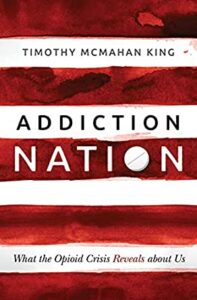 Addiction Nation: What the Opioid Crisis Reveal About Us Timothy McMahon King (Herald Press) $17.99 OUR SALE PRICE = $14.39
Addiction Nation: What the Opioid Crisis Reveal About Us Timothy McMahon King (Herald Press) $17.99 OUR SALE PRICE = $14.39
As the author boldly notes, “Opioids claim the lives of 115 people per day. One of them could have been me.”
You’ll have to read on to learn of King’s near-fatal illness that led his doctors to prescribe narcotics and how he ended up — like millions of others — quickly addicted in ways the doctors didn’t expect. This, of course, could have led him down an awful road of designer drugs — chemical concoctions from Mexico, China, or Europe, or meth labs from down the street — but he had the ability to ask profound questions about the spiritual and moral nature of his addiction (and the companies complicit in creating the opioid epidemic) and various sorts of paths toward healing and recovery.
King is the owner of Vagabond Consulting and also works with the Center for Action and Contemplation; his writings have appeared in places as diverse as Christianity Today, Sojourners, ABC, the BBC, Time.
The many reviews of this have been exceptional, yet we’ve not sold it much at all. I hope you read these reviews and wonder if the possibility of studying this together at your church might find it worth thinking about.
African American communities suffered the infiltration of death-dealing heroin in the 1970s and the atom bomb of crack in the 1980s. Our cries rarely made it to the pages of the New York Times, and few black drug addicts ever got to tell their story, though they writhed with the same agony fleshed out in Addiction Nation. Timothy McMahan King does not share a white addiction story. His story reveals the indiscriminate terror of addiction in the lives of human beings. I want every American to read this book. I want each reader to understand the horror of addiction through the framework of my friend’s struggle. And after turning the last page, I pray each reader closes their eyes and imagines the diverse mosaic of America in the clutches of this beast. Maybe then we might all be set free. — Lisa Sharon Harper, The Very Good Gospel, Fortune, and president of Freedom Road
That Timothy McMahan King survived the clutches of opioid addiction is a miracle. That he lived to tell the harrowing tale is a gift to the rest of us. Everyone battles the beast of addiction, whether it is to substances or to some other form of unbridled consumption we’ve deemed somehow more socially acceptable. If we are to find our collective way out of addiction’s societal morass, we need a voice and vision such as King’s–steady-eyed and compassionate, rational and reasoned, full of hope and rooted in grace–to lead the way. At once sweeping and deeply personal in its scope, Addiction Nation is an essential resource for anyone touched by addiction, which is all of us. — Cathleen Falsani, award-winning religion journalist, author of Sin Boldly: A Field Guide for Grace
HELPING BEAR THE BURDENS OF DOUBT or DECONSTRUCTION
I suppose we have nearly 40 books here in the store that could be considered about, for, or against, deconstruction, and we also have nearly that many about doubt, most that honor the age-old conundrum of holding faith while having doubts. Normal religious questioning and even doubt (which isn’t new, of course) and the sociological and/or theological shifts of moving from strict or toxic fundamentalism to a different sort of exvangelical worldview (as the new book by Sarah McCammon puts it) are different sorts of concerns, it seems. Both can be hard to bear alone. Normal doubts should be given plenty of room and Schaeffer’s old adage about “honest answers for honest questions” seems helpful. For those radically deconstructing all manner of convictions and even truth itself, may seem overlapping, but is often a different sort of quandary and takes other sorts of replies and support. Here are a couple that couple that you might find interesting.
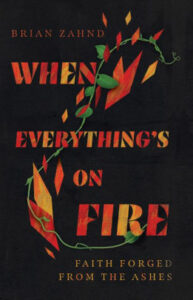 When Everything’s on Fire: Faith Forged from the Ashes Brian Zahnd (IVP) $22.00 OUR SALE PRICE = $17.60
When Everything’s on Fire: Faith Forged from the Ashes Brian Zahnd (IVP) $22.00 OUR SALE PRICE = $17.60
I think this great book from just last year by the ever-creative, honest, innovative, and deeply Biblical thinker and pastor, Brian Zahnd, is one of the very best about holding on to faith in an age of unbelief. Whether it is the air we breathe of secularism, whether it is the often edgy pleasures of skepticism and cynicism, many of our peers — many of us! — have been shaken.
Zahn gives us room to tear down some of the walls of a rotting structure, but reminds us not to destroy the building. It is a story told personally and pastorally as he extends an “invitation to move beyond the crisis of faith toward the journey of reconstruction.” I have commended this book before and I suggest it now for anyone wanting to understand those who are hurting while in a season of doubt of deconstruction. As Rich Villodas says, Zahnd has an “uncanny ability to help us navigate this present age.” Villodas recommends it for you if you are losing faith or if you want to help others hold on. The book is, by the way, among other things, an honest tribute to the beauty of Christ.
I believe the book you are holding now is one that truly only Brian Zahnd could write, and the precise book we needed him to write in this particular moment. His gift is clarity, and the way he focuses his prophetic vision here is so lucid, singular, and laser focused, it is almost blinding. Zahnd does not offer us certainty in uncertain times, which is always just a bad magic trick, anyway–he offers something much better: beauty. This is a flaming, scorchingly beautiful vision of faith in a world where faith has left many of us in the cold. — Jonathan Martin, author of The Road Away from God and How to Survive a Shipwreck
Brian Zahnd’s unique voice is neither ‘liberal’ nor ‘conservative.’ It is both cheekily irreverent and profoundly faithful. Above all, it is Christ-centered. He reminds me a bit of the late great William Stringfellow in his defiance of fashionable religious trends, and his fearless challenges to ‘monotheistic therapeutic deism.’ I just wish the church would listen to him more. Here’s your chance! — Fleming Rutledge, author of The Crucifixion: Understanding the Death of Jesus Christ and The Undoing of Death
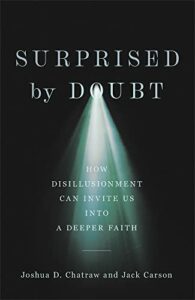 Surprised by Doubt: How Disillusionment Can Invite Us Into A Deeper Faith Joshua Chatraw & Jack Carson (Brazos Press) $21.99 OUR SALE PRICE = $17.59
Surprised by Doubt: How Disillusionment Can Invite Us Into A Deeper Faith Joshua Chatraw & Jack Carson (Brazos Press) $21.99 OUR SALE PRICE = $17.59
As noted, we have bunches of books on doubt. From an old classic (God in the Dark) by Os Guinness to the brief, recent Doubt by Adam Hamilton to the very honest guidebook by Brian McLaren, Faith After Doubt: Why Your Beliefs Stopped Working and What to Do About It, there is something for everyone.
Surprised by Doubt makes the case that doubt does not have to mean the end of Christian identity. Surely it doesn’t have to end in radical reconversion.
I like that they use the clear-headed metaphor from C.S. Lewis that Christianity is like a house and they invite us to move behind the “cramped attic of reactionary versions of the faith to explore the more spacious main floor of the house.” That is, they are inviting us to the faith’s classic structure.
I do not know if this book will ease the anguish of loved ones you know, but it is worth reading so you have this orientation under your belt. Highly recommended.
Reading Surprised by Doubt is like sitting in a comfortable room and enjoying a thoughtful conversation with generous and stimulating hosts. You leave feeling challenged, more knowledgeable, heard, and understood. The coffee is on. Come. And be sure to invite your friends. — Karen Swallow Prior, author of The Evangelical Imagination: How Stories, Images, and Metaphors Created a Culture in Crisis
For too long, doubt has wrongly been condemned, and the unfortunate reaction to the condemnation of doubt has been to celebrate it. Chatraw and Carson take a better approach, which is to address doubt, to seek to alleviate burdensome doubts, and to comfort in the midst of doubt. This is apologetics at its best, grounded not in the ‘right ideas,’ but in the person of Jesus, who is himself the Word, the Way, the Truth and the Life. This book will help you trust him. — Michael Wear, president of the Center for Christianity and Public Life; author of The Spirit of Our Politics
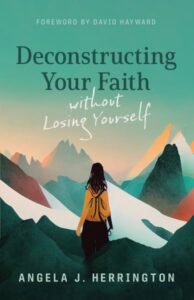 Deconstructing Your Faith Without Losing Yourself Angela J. Herrington (Eerdmans) $19.99 OUR SALE PRICE = $15.99
Deconstructing Your Faith Without Losing Yourself Angela J. Herrington (Eerdmans) $19.99 OUR SALE PRICE = $15.99
Did you know that there is a thing now called “deconstruction coaches”? Part counselor, part therapist, part spiritual director, these guides help folks think through their feelings and convictions about, often, toxic and harmful religious upbringings or hurtful, overly-rigid churches. Angela Herrington is such a coach and, man, she has heard a lot. She has hear of awful religious trauma and she has invited those harmed by bad religion to cultivate a healthy spirituality. (She has a BA in biblical studies, by the way, from Indiana Wesleyan and an MA in leadership from Wesley Seminary.) There is a swirl of deconstruction going on these days (and memoirs of those who have drifted or bolted from evangelical faith.) She has written here a book about healing religious trauma by “releasing harmful beliefs.” It has been called a “beautiful and comforting balm” and for those who are “wrestling, wondering, and wandering…”
A key to her approach is that whatever one comes to believe, it has to be your own call, your own deeply considered and held convictions (even if that is a principled sort of agnosticism, not being ready to settle on anything.) That is, one must be authentic — which has the feel of a very contemporary value, but also sounds like the invaluable freedom of conscience that the best of the Western social philosophies have always valued. I’m not sure if this book will be life-changing for everyone, but it is valuable piece of the puzzle, a good start towards wholeness and personal integrity as one realized they aren’t alone in the journey and that they can navigate “the nuances of the life-changing shifts in their worldview.”
Angela Herrington has tackled a triggering topic in a beautiful and compassionate way. Her approach empowers the reader to explore faith deconstruction at their own pace without shame, fear, or judgment and with no agenda other than authenticity. –Tiffany Yecke Brooks, author of Gaslighted by God: Reconstructing a Disillusioned Faith
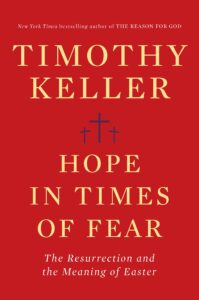 Hope in Times of Fear: The Resurrection and the Meaning of Easter Timothy Keller (Penguins) $17.00 OUR SALE PRICE = $13.60
Hope in Times of Fear: The Resurrection and the Meaning of Easter Timothy Keller (Penguins) $17.00 OUR SALE PRICE = $13.60
I know you know that I very, very deeply respected (and usually agreed with, but not always) the late New York pastor and thinker, Timothy Keller. His blend of intellectual rigor and delightful popularization, his ability to write books for the masses that were literary and thoughtful, his open-mindedness about culture contexts even as he held to fairly standard forms of conservative Reformed theology are all assets in my view. Agree or not with all his details, his overall presence in the world of Christian writing in the last 25 years has been nothing short of a God-send. We were grateful to know him a bit and glad to have had the opportunity to serve his church from time to time with book displays, mail-orders, and the like.
Anyway, one of Tim’s great gifts was offering keen and clear gospel presentations in a way that made sense and were often compelling. Artists, scientists, politicos, theatre people, business guys, techies, medical leaders and disillusioned church drop-outs have all come to vibrant and robust relationships with Christ and found new life in Christ’s church by listening to Keller or reading his stellar books on apologetics. (Or, his culturally savvy critiques of the false idols of our age, like his Counterfeit Gods.)
I think this is one of the best he has written, centering the questions of the truthfulness of Christianity with the question of whether it can provide viable hope. And that comes down to the questions of the implications that flow from the historicity of the bodily resurrection.
As it says on the back:
The resurrection can shape every aspect of our lives — our inner emotional lives, our relationships, our pursuit of justice, and our attitudes toward history and even death itself.
This is a great book to read after Easter-time, especially in a season when we are still struggling with illness and despair and hold a near-desperate longing for authentic hope. Whether you are struggling with doubt or deconstruction or whether you just need reassurance and reminders of the central truths of the gospel-centered life, this book can be a strong help. Thanks be to God.
HELPING BEAR THE BURDEN OF DISABILITIES
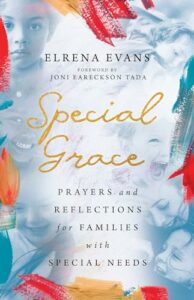 Special Grace: Prayers and Reflections for Families with Special Needs Elena Evans (IVP) $16.00 OUR SALE PRICE = $12.80
Special Grace: Prayers and Reflections for Families with Special Needs Elena Evans (IVP) $16.00 OUR SALE PRICE = $12.80
One way to understand the unique foibles and challenges and joys and concerns of parents with children with special needs, as they say, is to dip into this marvelous collection of prayers and devotionals. There are prayers here, as I have said when I first highlighted it, for any number of very special concerns for parts of disabled or differently abled kids, from feeling a sense of loss about certain things to prayers for educational meetings and for medical consults and so on. This is a book that would surely be useful for anyone with family members with disabilities, and, I think, would be good for those who want to pray with authenticity for friends and loved ones with in these situations. This little book is poetic and strong, honest but not maudlin or sentimental. I hope you consider it. Maybe you should get it an pray the prayers for somebody you know…
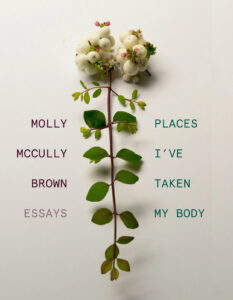 Places I’ve Taken My Body: Essays Molly McCully Brown (Persia Books) $24.95 OUR SALE PRICE = $19.96
Places I’ve Taken My Body: Essays Molly McCully Brown (Persia Books) $24.95 OUR SALE PRICE = $19.96
I think this luminous memoir, essays of the most thoughtful sort, is a treasure (and enjoyable read) and a tremendous example of a book to read to understand more about how those in wheelchairs live their lives. (Or at least how this woman lives her life.) This is a fruitful and generative collection of essays, so very well written, that alert many to the topic of understanding disabilities, clearly avoiding sentimentality or thinking that those with disabilities are essentially less, hurting, needy, which isn’t a good place to come alongside anyone. Rather, this “work of great humanity” is a look at “the poetry that sings beneath the everyday.”
I want to press this book into the hands of everyone I know. Writing from the locus of her own constantly changing, often intractable body, Molly McCully Brown captures the fullness of the human experience — desire, loss, flesh, faith, poetry, place, memory — with lyric compression and expansive grace. Reading these exquisite essays made me want to get out and do something with my own body — kneel at an altar and recite the Hail Mary, stub out a cigarette in Bologna, stand on a hilltop and shout expletives at the Trump administration. Which is to say, these are urgent, compelling essays that remind us how to be fully alive inside our own bodies, wherever we take them. — Jamie Quatro, author of “Fire Sermon” and “I Want to Show You More”
There is great, mature grace in this as she helps us — as Eliza Griswold puts it — “look long and hard at our own interior landscapes.” It may be “a wrenching addition to the literature of disability” (Kirkus Review) but is so much more.
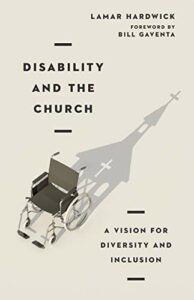 Disability and the Church: A Vision for Diversity and Inclusion Lamar Hardwick (IVP) $18.00 OUR SALE PRICE = $14.40
Disability and the Church: A Vision for Diversity and Inclusion Lamar Hardwick (IVP) $18.00 OUR SALE PRICE = $14.40
There are many books that offer a serious theology of disability and this author — a black pastor who self-identifies as neurodiverse (he used to call himself “The Autism Pastor”) — is a lover of Jesus and a good writer who “weaves together his personal experience, the history of the church, and today’s much-needed conversation on diversity to lay a blueprint for inclusion in the local church.” He knows the barriers to leadership that those with disabilities face and knows how God’s inclusive grace points us to live more generously. This really is one of our favorite books that explore disabilities studies in Christian perspective, not too academic, but not merely a nice and inspiring story. There are practical steps and strategies to build better communities, too, so it is highly recommended. Start here.
His new one is a bit more serious and looks to be remarkably innovative. I’m excited to soon read his recent one, How Ableism Fuels Racism: Dismantling the Hierarchy of Bodies in the Church (Brazos; $19.99.) Wow.
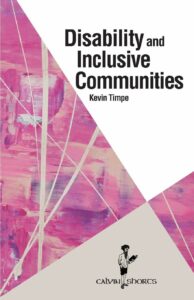 Disability and Inclusive Communities Kevin Timpe (Calvin College Press) $10.99 OUR SALE PRICE = $8.79
Disability and Inclusive Communities Kevin Timpe (Calvin College Press) $10.99 OUR SALE PRICE = $8.79
This is a small book, in the series called “Calvin Shorts” where Calvin University professors write short introductions to topics they care deeply about, showing how their research and professing within higher education could have influence on the ground, in the churches, and for ordinary folks. From sports to urban renewal to immigration and more, these are fantastic little books, ideal for anyone who wants a solid, Christianly conceived, overview of a key topic. This “Shorts” one on disability issues is really superb. Don’t miss it.
Kevin Timpe teaches philosophy at Calvin, actually, and has been a visiting scholar or teacher at schools all over the world, from Oxford to Peking. He’s published tons of scholarly articles edited dozens of books. He is the founder and President of 22 Advocacy, which “engages in educational advocacy for students with disabilities in public schools.” He has spoken on disability themes to both academic and lay audiences, again, all over the world. He does so as a thoughtful, Christian scholar but also a parent. He knows what he’s talking about.
As it says on the back cover,
“Disability and Inclusive Communities intends to help readers learn how to build communities that fully include people with disabilities. Often our social practices unintentionally exclude those with disabilities by making it difficult for them to fully participate in the community. These practices hurt those whom we exclude. But they are also bad for our communities as a whole…”
There are six short chapters of energetic writing making this a quick read for almost anyone and an ideal, meaty little book for adult ed classes, Sunday schools, book clubs, or Christian growth groups.
HELPING BEAR THE BURDEN OF LONELINESS
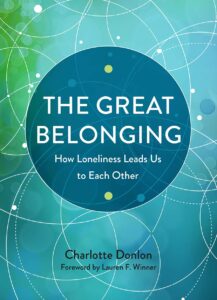 The Great Belonging: How Loneliness Leads us to Each Other Charlotte Donlon (Broadleaf) $16.99 OUR SALE PRICE = $13.59
The Great Belonging: How Loneliness Leads us to Each Other Charlotte Donlon (Broadleaf) $16.99 OUR SALE PRICE = $13.59
What a great little book this is, compact sized so nice to hold, with a really excellent style and aesthetic. Charlotte Donlon is a very smart thinker and a very good writer. This is a book I’d recommend to nearly anyone, almost anywhere. My friend Marlena Graves calls it “articulate, beautiful, and brooding…” That writer, theologian, and Episcopal priest Lauren Winner wrote the lovely forward might indicate the calibre of books this is.
Think about the title itself, for starters: the Great Belonging. Yes, loneliness has reached epidemic proportions, and, as it says on the back, “in an age of mobility and fraying civic life, we are all susceptible to its power.” So what is to be done? What does Donlon mean by a Great Belonging?
She is intentionally reframing the notion of loneliness and here “offers us a language for the disquiet within.” Or, as Ms Winner puts it, The Great Belonging “addresses loneliness as a companion.” And, as you would with any companion, it “inquires into loneliness — into loneliness’s history, and habits, and fears.” This extraordinary book will help you “get to know it better.”
Donlon has a multi-faceted approach, which is sensible, since loneliness touches all aspects of our lives. She thinks that once we come to know our loneliness better, it open us up to ourselves and the world (literally, to nature, and to culture.) She has a section about belonging to “our places” and another about belonging “through art.” Of course there is teaching about belonging to God. Short pieces move from “mother-daughter connections” or “coffee shop company” to “nature’s comfort” to “poems for the dead.” She has a chapter near the end called “Suffering, Resilience, and Our Hope for Shalom.”
This richly written book of thoughtful reflections is sure to help anyone who is lonely, and it is certainly wise for all of us to have at our disposal, to ponder, so we know how to share the burdens of others. Highly recommended.
 Wait With Me: Meeting God in Loneliness Jason Gaboury (IVP) $16.00 OUR SALE PRICE = $12.80
Wait With Me: Meeting God in Loneliness Jason Gaboury (IVP) $16.00 OUR SALE PRICE = $12.80
When I first reviewed this I raved about it, taken, at first, by James K.A. Smith’s blurb insisting that this is “a poignant, wise, at times searing invitation.” Indeed. I recommend it widely because the “searing” narrative exposes us all to what so many are going through. In this case, Jason is, at first blush, an outwardly effective, happy, faithful, energetic campus ministry person, working for IVCF in the hustle and bustle of New York City. Alas, when his older, Catholic spiritual director said, simply, that loneliness is part of being human, Jason was taken aback. It was, indeed, how he felt.
Wait With Me is not a book that attempts to solve loneliness, but, rather, invites us to think of it as a call from God. As James Cheung puts it, “this book honestly and refreshingly invites us to stay with (our loneliness) and find Jesus in the spaces and places where we’d rather not be.”
Can this provide healing for others, maybe for yourself? It is an excellent, moving read, radical stuff, in a way, what Sharon Garlough Brown calls “both hope-filled and liberating.”
There are excellent study or reflection questions at the end of each of 11 chapters, each with one-word titles. This is an artful, impressive, deeply helpful book.
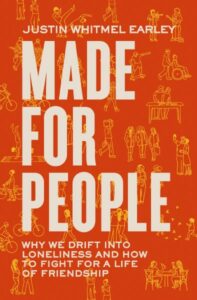 Made for People: Why We Drift into Loneliness and How to Fight for a Life of Friendship Justin Whitmel Earley (Zondervan) $19.99 OUR SALE PRICE = $15.99
Made for People: Why We Drift into Loneliness and How to Fight for a Life of Friendship Justin Whitmel Earley (Zondervan) $19.99 OUR SALE PRICE = $15.99
Many readers will know Early from his best-selling book The Common Rule which invites us to manage a rhythm of life that includes forming habits each day, week, month, and setting up ways to stop doing certain things each day. His colorful charts and grids and diagrams make it a very fun book to read and very, very helpful. He’s a smart, sharp, guy — a hit at our Jubilee conference out in PIttsburgh — who knows deeply from personal experience how an unfettered life of ambition and busyness can be deadly.
After doing that book (and a companion volume designed for families called Habits of the Household) he shifted just a bit to write about what Kyle Idleman calls his “clarion call to covenant friendship.” To achieve that — the thrust of this moving book — requires, for starters, a commitment to vulnerability.
Loneliness has become a cultural epidemic (“effecting the health and happiness of millions.”) Not only are the habits of busyness and on-line obsessions to blame, since to forge healthy relationships we need to overcome our fear of being vulnerability, of being known, and our past pains sometimes stop of from develop the deep friendships we long for. Still, as he makes clear, we are made for people, for others, for relationships.
Happily, in recent years there have been many good books on friendship. This one offers deep friendships as an antidote to the epidemic of loneliness and offers “key habits that most a lifestyle of friendship” in contrast to the isolation that seems to be a rising mode of modern life. This offers insights for those wanting more meaningful and lasting relationships and, I think, could be the inspiration for some of us to reach out more intentionally to those who are isolated and alone. There are plenty of personal stories, lots of key take-aways, a few charts and sidebars in lovely colored ink, all rooted in a bunch of Biblical stories and sensible theological teachings. This is a really fine book, nicely done, upbeat and helpful. We highly recommend it.
HELPING BEAR THE BURDEN OF ILLNESS
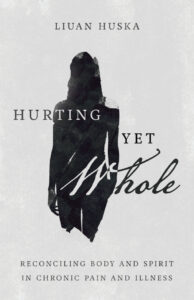 Hurting yet Whole: Reconciling Body and Spirit in Chronic Pain and Illness Liuan Huska (IVP) $20.00 OUR SALE PRICE = $16.00
Hurting yet Whole: Reconciling Body and Spirit in Chronic Pain and Illness Liuan Huska (IVP) $20.00 OUR SALE PRICE = $16.00
We have on occasion listed other great memoirs and studies of chronic pain and ongoing illnesses, and the growing literature in the field (including some from overtly Christian perspectives) is heartening. So many have to cope with ongoing pain and hurt and sicknesses. From chronic lyme diseases to autoimmune disorders to long-haul Covid symptoms to just the discomfort of being human in real bodies, nearly everyone can benefit from some sustained reflection on this topic. There are those who need your help, or at least your awareness of what life might be like for them.
This is my favorite book on this topic, powerful and compelling, thoughtful and well-done. That a professor of anthropology at Wheaton College says it is “in the vein of Malcolm Gladwell or Andy Church” is cool, as he continues how multidisciplinary she is, fluent in so much, and then says, “If you have a body or know someone who does, this book is for you.” Alrightee then.
The Christian story speaks to our experience of pain and illness. In Jesus’ own embodiment, we see an embrace of the body and of all the discomfort and sufferings of being human. Huska shows that healing is not an escape from the limits of the body, but instead we become whole as souls in bodies and bodies with souls. As chronic pain forces us to pay attention to our vulnerability, we come to embrace the fullness of our broken yet beautiful bodies.
Again, in trying to highlight how this book invites us to a wholistic view of our very selves, and how our frustrating and sometimes agonizing pain can help honor that relationship between what some call “body” and “soul”, Karen Swallow Prior nicely notes that Huska “tenderly and humanely stitches these two parts of our humanity back together in this wise and lovely book.”
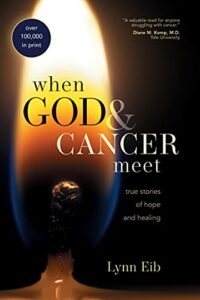 When God and Cancer Meet: True Stories of Hope and Healing Lynn Eib (Tyndale) $15.99 OUR SALE PRICE = $12.79
When God and Cancer Meet: True Stories of Hope and Healing Lynn Eib (Tyndale) $15.99 OUR SALE PRICE = $12.79
We certainly have many more than a dozen books on cancer at any given time and as the disease continues to ravage our nation we know that more spiritual help will be needed to help those with life-threatening illness; believe me, my own small brush with the invasion in my own body is disturbing. I can’t imagine those who cope with more serious diagnoses.
Still, with the many new resources and great books of various levels and sorts, we come back to this best-seller over and over. Not just because Lynn is a long, long friend and because all of the stories told in this book are from here in York County, Pennsylvania, but because, in the telling of the tales, she captures warmth, hope, faith, and a reminder that no matter what, God’s healing touch is deeper than whatever pit cancer puts us in.
I’ve told the story before: Lynne had serious cancer decades ago and her husband, a friend and local pastor, naturally had a prayer group at their church for her. When she went into remission (healed?) they kept it up. Eventually, her oncologist — himself a former Jewish person who had become a Christian — in Hanover Hospital asked her to work in his office as a prayer warrior, spiritual guide, faith-based counselor for any of his patients who wanted her friendly support. It may have been the first time in the nation when a doc hired a prayer-person and they ended up getting some notice for this nod to wholistic health. In any case, this remarkable book tells the stories of those she came to know. Some went into remission, some did not. Some lived, some did not. All in all, this book of powerful stories about cancer patients and their families shows how God can touch us all.
There is grit and detail in these stories, attesting to the emotions, physical set-backs, relational gifts, and struggles as folks trudge to test after test, surgeries, chemotherapies, radiation, and more.
Need a dose of real hope? Then here’s your prescription. When God & Cancer Meet will open your eyes to the promises of God in times of suffering and to the merciful God who made those promises. — Dave Dravecky, president and founder of Dave Dravecky’s Outreach of Hope
When God and Cancer Meet is a harbor of hope and a bounty of blessings for those devastated by a dreadful diagnosis.– Dale A. Matthews, M.D., author of The Faith Factor: Proof of the Power of Prayer
By the way, we have both of the handsome, faux-leather devotionals Lynn created. 50 Days of Hope: Daily Inspiration for Your Journey Through Cancer in its classy, lime-green cover, and the slightly bigger, deep blue, night-sky covered, Peace in the Face of Cancer.
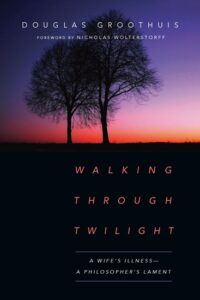 Douglas Groothuis (IVP) $21.00 OUR SALE PRICE = $16.80
Douglas Groothuis (IVP) $21.00 OUR SALE PRICE = $16.80
We have a lot of books about dementia and Alzheimer’s disease, few more powerful than this one. We have followed the work of Doug Groothuis (at Denver Seminary) for decades — he has written sharp critiques of eccentric new age worldviews, of odd-ball books about Jesus, about ways in which the church’s apologetics have too often been too little, too late, to a culture in spiritual crisis. His most recent book is the fascinating Philosophy in Seven Sentences.
One thing he knows better than most — as theologian, philosopher, apologist — is that things fall apart; we live in a broken and tragic world. The losses experienced by his wife (and himself, too) when his wife was diagnosed with early onset Alzheimers, have been horrendous. Yet, despite the “unadorned truth” of it all, there is an astonishing sene of God’s presence. As his friend J.P. Moreland puts it,
There are no cheap Christian slogans, no slapping of Bible verses as a Band-Aid on a near-mortal wound, no simplistic happily-ever-after.
But, as Moreland continues:
But there is hope. Hope built on deep reflection bout Christianity, suffering, and the meaning of life.
For those who want a raw and honest expression of the agony of this situation, framed by a Christian thinker developing his own, urgent theodicy, this could be a great help.
Could I write as Doug Groothuis does here? Could I even begin to? I was profoundly humbled by this memoir. Philosophers are all about clear thinking, but the classroom is beggared by the anguish described here with such searing honesty, such poetic insight, such intense clarity, and such unconquerable hope. — Os Guinness, author of The Great Quest: Invitation to an Examined Life and a Sure Path to Meaning and Signals of Transcendence: Listening to the Promptings of Life
HELPING BEAR THE BURDEN OF DEPRESSION and MENTAL ILLNESS
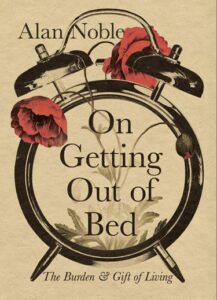 On Getting Out of Bed: The Burden & Gift of Living Alan Noble (IVP) $20.00 OUR SALE PRICE = $16.00
On Getting Out of Bed: The Burden & Gift of Living Alan Noble (IVP) $20.00 OUR SALE PRICE = $16.00
We have highlighted this before, telling often how our friend Alan Noble — who has written serious and even witty books about culture, theology, faith, and public witness in this secular age — surprised us when he wrote in this vulnerable little volume about his own depression, struggles, and about how difficult normal human life can sometimes be. It is a personal essay, to be sure, but it seems nearly universal to me. We all, whether seriously struggling with depression, or just exhausted from the weight of the world, have a hard time facing things. There is, as he puts it, a burden in living.
And a gift, a great gift. He knows God made the world very good; he knows that sin and brokenness abound — we hurt others and others hurt us, we might say — and he has great hope in the restoring goodness of a God who cares. In all of this, we can open ourselves to others and be transformed. We can carry on, amidst great suffering.
I like Wes Hill’s insightful words about On Getting Out of Bed:
As a Christian who has suffered acute psychological pain and has often struggled to find Christian writers who understand and can help, I am truly grateful for this book. It is frank but doesn’t overshare; it gives pointed advice but doesn’t hector. Most of all, it points to the One who has gone into the deepest furnace of human anguish and has come out the other side, bearing us all in his wake. — Wesley Hill, author Spiritual Friendship, professor of New Testament at Western Theological Seminary in Holland, Michigan
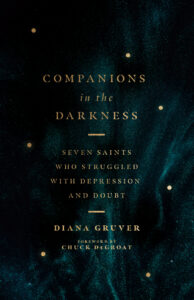 Companions in the Darkness: Seven Saints Who Struggled with Depression and Doubt Diana Gruver (IVP) $18.00 OUR SALE PRICE = $14.40
Companions in the Darkness: Seven Saints Who Struggled with Depression and Doubt Diana Gruver (IVP) $18.00 OUR SALE PRICE = $14.40
We have mentioned this often as it is such a refreshing book — painful and honest as the author tells her own struggles with depression — as it shares a bit of honest church history. Many of our great saints and church leaders and missionaries coped with serious depression and doubt. From Martin Luther to Martin Luther King, William Cowper to Mother Teresa, she fill us in and helps us realize we are not alone.
I like how the great Gerald Sittser describes this book, saying how she strikes such a fine tone — what a good job she did, and how good of Sittser to name it so well:
Diana Gruver has written a compelling book. In it she tells the stories of seven historical figures, some but not all household names, who suffered severe depression. Gruver does it just right, avoiding the many pitfalls that could have made the book excessively sentimental or judgmental. She lets the individuals describe their own experiences, refusing to subject them to modern clinical diagnosis. She chooses quotes from their writings that are so profound, human, and powerful that I kept tearing up, drawn into the nightmare of their condition. Her writing is clear and cogent and luminous. She tells their stories with sensitivity and compassion. She gives her subjects voices, as if letting them speak across the years to us. Her commentary and reflections along the way are full of hope. This is the kind of historical writing that is both responsible and moving. I will recommend this book to my friends. — Gerald L. Sittser, professor of theology at Whitworth University and author of A Grace Disguised
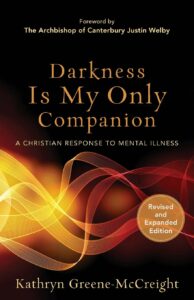 Darkness Is My Only Companion: A Christian Response to Mental Illness Kathryn Greene-McCreight (Brazos Press) $22.99 OUR SALE PRICE = $18.39
Darkness Is My Only Companion: A Christian Response to Mental Illness Kathryn Greene-McCreight (Brazos Press) $22.99 OUR SALE PRICE = $18.39
How many times have we suggested this as one of the very best books on the topic? Now in a revised and expanded edition, with blurbs on the back from scholars such as Stanley Hauerwas and Matthew Stanford (author of the excellent Grace for the Afflicted: A Clinical and Biblical Perspective on Mental Illness), Darkness remains one of the essential books in this whole category. It offers her personal story of coping with her bi-polar disorder and, while painful at times, it is informative and some might say it is more than helpful, but healing. She writes well (as a pastor and Episcopal priest) and offers poignant and even prophetic insight about the nature of the mental health crisis today.
In this honest and poignant reflection Kathryn Greene-McCreight seeks to ‘witness to the working of the triune God in the pain of one mentally ill Christian.’ She does so beautifully, graciously guiding readers through the depths of depression and the cacophony of mania to the hard road of ‘reconstruction’–always relying on Scripture and the prayers and hymns of the church to give voice to her experience. This ‘extended prayer’ of a book is a gift to the church and to anyone who seeks to walk faithfully alongside someone with mental illness. — Warren Kinghorn, Duke University Medical Center and Duke Divinity School
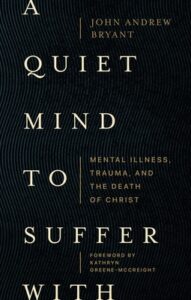 A Quiet Mind to Suffer With: Mental Illness, Trauma, and the Death of Christ John Andrew Bryant (Herald Press) $19.99 OUR SALE PRICE = $15.99
A Quiet Mind to Suffer With: Mental Illness, Trauma, and the Death of Christ John Andrew Bryant (Herald Press) $19.99 OUR SALE PRICE = $15.99
Author John Andrew Bryant’s friend Caleb Musselman notes that “this book is oxygen for those desperate for air.” Yes, indeed — this is what a book can do, give you a change to breath!
And to know you are not alone.
A Quiet Mind to Suffer With is not a cheery, simple book to read; it is excellently written, creatively done, even, with a good eye not only to telling his own hard story, but to interspersing it with rich, solid, Biblical understandings about the story of Christ and his suffering. One reviewer called it “stunning” and is right in saying it is “so rare and so beautiful.”
John is sure that there is a relationship between his agony and Christ’s. He sets side by side his vivid telling of own mental breakdown, his journey to the psych ward, his long, slow, painful recovery and how Christ uses even “our agony and despair to turn us into servants and guests of the mercy offered in his gospel.”
This will help you understand the complexities of a mind that is somehow not right and, as with the opening words of this BookNotes, will help you relate our caring to the suffering of Jesus. As Bryant powerfully puts it, noting Christ’s torture and murder, “suffering has been made holy by Christ’s proximity to it.”
+++
TO PLACE AN ORDER
PLEASE READ, THEN SCROLL DOWN AND CLICK ON THE “ORDER HERE” LINK.
It is helpful if you tell us how you want us to ship your orders.
The weight and destination of your package varies but you can use this as a quick, general guide:
There are generally two kinds of US Mail options and, of course, UPS. If necessary, we can do overnight and other expedited methods, too. Just ask.
- United States Postal Service has the option called “Media Mail” which is cheapest but can be a little slower. For one typical book, usually, it’s $4.33; 2 lbs would be $5.07. This is the cheapest method available and seems not to be too delayed.
- United States Postal Service has another, quicker option called “Priority Mail” which is $8.70, if it fits in a flat-rate envelope. Many children’s books and some Bibles are oversized so that might take the next size up which is $9.50. “Priority Mail” gets much more attention than does “Media Mail” and is often just a few days to anywhere in the US.
- UPS Ground is reliable but varies by weight and distance and may take longer than USPS. Sometimes they are cheaper than Priority. We’re happy to figure out your options for you once we know what you want.
If you just want to say “cheapest” that is fine. If you are eager and don’t want the slowest method, do say so. It really helps us serve you well so let us know.
BookNotes
SPECIAL
DISCOUNT
20% OFF
ALL BOOKS MENTIONED
+++
order here
this takes you to the secure Hearts & Minds order form page
just tell us what you want to order
inquire here
if you have questions or need more information
just ask us what you want to know
Hearts & Minds 234 East Main Street Dallastown PA 17313
read@heartsandmindsbooks.com
717-246-3333
Sadly, as of March 2024 we are still closed for in-store browsing. COVID is not fully over. Since few are reporting their illnesses anymore, it is tricky to know the reality but the best measurement is to check the waste-water tables to see the amount of virus in the eco-system. It isn’t good. It is important to be aware of how risks we take might effect the public good — those at risk, while not dying from the virus, are experiencing long-term health consequences. (Just check the latest reports of the rise of heart attacks and diabetes among younger adults, caused by long Covid.) It is complicated, but we are still closed for in-store browsing due to our commitment to public health (and the safety of our family who live here, our staff, and customers.) Our store is a bit cramped without top-notch ventilation, so we are trying to be wise. Thanks very much for understanding. We know this is unusual, but it is our situation now.
We will keep you posted about future plans. We are eager to reopen. Please pray for us.
We are happily doing our curb-side and back yard customer service and can show any number of items to you if you call us from our back parking lot. It’s sort of fun, actually. We are eager to serve and grateful for your patience. We are very happy to help, so if you are in the area, do stop by. We love to see friends and customers, old and new.
We are happy to ship books anywhere.
We are here 10:00 – 6:00 EST / Monday – Saturday. Closed on Sunday.

